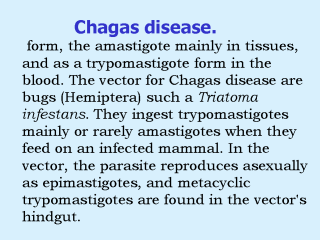| front |1 |2 |3 |4 |5 |6 |7 |8 |9 |10 |11 |12 |13 |14 |15 |16 |17 |18 |19 |20 |21 |22 |review |
 |
The vector defecates on the host's skin when it
feeds, and the metacyclic trypomastigotes enter the host's bloodstream, most often by
being rubbed into the bite. The local inflammation caused by the entry of T. cruzi is
called chagoma. Chagoma of the eye, Romana' sign, is seen in most of patients diagnosed
as recently infected. The chronic or permanent stage of the disease likely involves an
enlarged heart, due to antibody-antigen conflicts. |